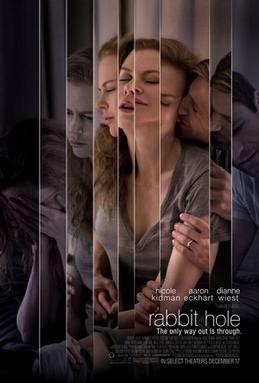
(Courtesy of Wikipedia Commons)
Wouldn’t it be nice to slip away to a parallel universe? To even think about escaping life’s struggles and grief, for just a second, sometimes makes the thought of alternate realities pure bliss.
Directed by John Cameron Mitchell, “Rabbit Hole” is a film that explores the idea of alternate realities by depicting the challenges of retaining a marriage after the loss of family. In the film, Becca (Nicole Kidman) and Howie (Aaron Eckhart) Corbett’s perfect life is shattered when their 4-year-old son is accidentally killed by a moving car.
What ensues after the loss is not pure chaos, but rather quiet, obsessive behavior by both parents. Howie tries to hold on to every memory by constantly replaying videos of his son on his phone. All the while, Becca cannot stand to be reminded of her lost child and tries to get rid of everything reminding her of her departed son.
Eckhart’s character is far away from his role in the political satire “Thank You for Smoking” and his large budget “Batman: The Dark Knight” performance. In “Rabbit Hole,” Eckhart portrays a normal, decent man. He easily could have been intimidated by Kidman’s mesmerizing performance and become lost in her shadow, but he manages to put equal focus on his character. Howie feels just as abandoned as Becca feels, allowing Eckhart to play off the instability of Kidman’s character, making the suffering all the more heart wrenching.
One of the chaotic scenes that holds prominence in the film is when Becca has supposedly erased one of the videos from Howie’s phone. Everything collapses. Any hope for happiness seems destroyed and both characters fall deeper into the abyss of heartbreak.
Kidman is an obvious standout in this scene. Her portrayal of a woman who is dumbfounded by this accusation encapsulates the essence of the character and the movie in its entirety. The couple is awestruck by their reality. Kidman’s subtle and meticulous dedication to her role, as well as her first-time experience as a film producer, helps the audience begin to understand the couple’s sorrow.
The film succeeds because Mitchell is able to profile this couple’s pain in a manner that is not overdone. In the highly dramatic scenes, the film’s score is toned down to the point where the chaotic tensions seem very natural and almost inevitable. There are many moments in “Rabbit Hole” that are cringe-worthy, but these scenes aren’t artificial to the point where the audience abandons hope that this couple will improve themselves and their relationship. Instead of glossing over the uncomfortable, Mitchell displays the ugly truths of destruction upfront to find a sense of normalcy.
This normalcy comes in very peculiar ways for Howie and Becca. Why does Howie find happiness smoking marijuana with a support group veteran (Sandra Oh)? Why does Becca find solace in meeting the teenager (Miles Teller) who killed her child and reading his self-made comic books?
These answers are never revealed and honestly don’t matter. Rather, a different connection is made when the two are done falling into these other realities, as one has to face abandonment at the possibility of their spouse leaving them. The film raises the question to audience members of how one would respond if their perfect universe was stripped away.
This film isn’t about feeling better: it doesn’t even promise that tomorrow will be a brighter day. “Rabbit Hole” has a much more realistic approach to mourning, in that one must deal moment to moment with grief as an ever-changing emotion. Grief never goes away, but the current reality seems slightly more manageable.
Contact CU Independent Copy Editor Ben Macaluso at Ben.macaluso@colorado.edu.
